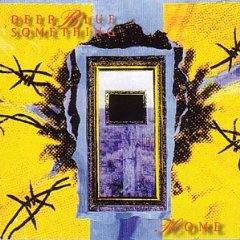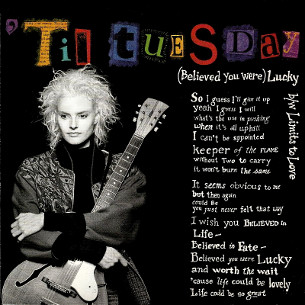
Lost in Space is the fourth album by singer-songwriter Aimee Mann, released in 2002 on her own label, SuperEgo Records. A special edition released in 2003 featured a second disc containing six live recordings, two B-sides and two previously unreleased songs.

Aimee Elizabeth Mann is an American singer-songwriter. Over the course of four decades, she has released more than a dozen albums as a solo artist and with other musicians. Her work with the producer Jon Brion in the 1990s was influential on American alternative rock, and she is noted for her sardonic and literate lyrics about dark subjects.

Michael Daniel Penn is an American musician, singer and composer. His 1989 single "No Myth" was a top 20 hit in the US and successful in several other countries.

Gimme Fiction is the fifth studio album by American indie rock band Spoon. It was released on May 10, 2005, through Merge Records in the US and Matador Records in Europe. It debuted at number 44 on the Billboard 200. "I Turn My Camera On" was released as a single, and has become one of the band's biggest hits to date. A deluxe reissue of the album was released on December 11, 2015 to commemorate its 10th anniversary.

Secaucus is the second album by the American rock band The Wrens, released in 1996. Secaucus is named for the city in which it was recorded, Secaucus, New Jersey. The Wrens were signed to major label Grass Records for the album; Grass dropped the band after they refused to be forced into a new contract. The Wrens' follow-up to Secaucus, The Meadowlands, was released seven years later, in 2003.

The Forgotten Arm is the fifth album by singer-songwriter Aimee Mann, with illustrations by artist Owen Smith. It was released by SuperEgo Records on May 3, 2005. It is a concept album, telling the story of two characters who run off with each other to escape their problems, but end up in more trouble than either of them could have imagined. The album reflects Mann's own boxing in its story and illustrations. The title is derived from a move in which one arm is used to hit the opponent, causing him to "forget" about the other arm, which is then used to deliver a harsher blow.

Candy Ass is the eighth studio album by American singer-songwriter and lead vocalist of American Music Club, Mark Eitzel. It was released on October 3, 2005, by Cooking Vinyl.

"Shoo-Be-Doo-Be-Doo-Da-Day" is a 1968 single released by American and Motown recording artist Stevie Wonder. The song, co-written by Wonder and produced by Henry Cosby and Sylvia Moy, was the first to showcase Wonder's talents at the clavinet and was one of his first successful co-written tracks during his 1960s Motown period. The song reached number nine on the Billboard Hot 100 pop singles chart in 1968, and went to number one on the R&B chart.

Kingdom Blow is the seventh studio album by the American hip hop musician Kurtis Blow, released in 1986.

Cockamamie is the debut album from Boston-based musician Jen Trynin. First released in 1994, the album failed to do well on the charts when re-released by Warner Bros. Records in 1995, in spite of positive reviews. The track "Better Than Nothing" was released as a single from the album.

Amber Headlights is an album by Greg Dulli, released in 2005.

Paul Bryan is a Grammy-winning Los Angeles-based music producer, arranger, songwriter, and bassist.

"Old Time's Sake" is a song by American rapper Eminem featuring fellow American rapper and producer Dr. Dre, and is the only promotional single from the former's Relapse (2009).

Home is the second studio album by the American band Deep Blue Something. It was released by RainMaker Records in 1994, and rereleased on Interscope in 1995. The band supported the album by touring with Duran Duran.

The Both was an American indie rock musical duo consisting of Aimee Mann and Ted Leo. They began collaborating in 2013 and released a self-titled album in April 2014.

Mental Illness is the ninth studio album by singer-songwriter Aimee Mann. It was released on March 31, 2017, by SuperEgo Records. Mann described it as her "saddest, slowest and most acoustic" album. The album won the 2018 Grammy Award for Best Folk Album.

"(Believed You Were) Lucky" is a song by American band 'Til Tuesday, which was released in 1988 as the lead single from their third and final studio album Everything's Different Now. The song was written by Aimee Mann and Jules Shear (music), and produced by Rhett Davies. "(Believed You Were) Lucky" peaked at No. 95 on the US Billboard Hot 100.

"That's Just What You Are" is a song by American singer-songwriter Aimee Mann, which was released in 1994 as a single from the soundtrack of Melrose Place. It was also included on Mann's second studio album I'm with Stupid (1995). The song was written by Mann and Jon Brion, and produced by Mike Denneen.
"The Other End (Of the Telescope)" is a song by American band 'Til Tuesday, which was released in 1988 on their third and final studio album Everything's Different Now. The song was written by Aimee Mann and Elvis Costello. Costello recorded his own version of the song for his 1996 album All This Useless Beauty.

Year of Mondays is an album by the American alternative rock musician Mike Johnson, released in 1996. Dedicated to Charlie Rich, it was Johnson's first album for a major label.



















